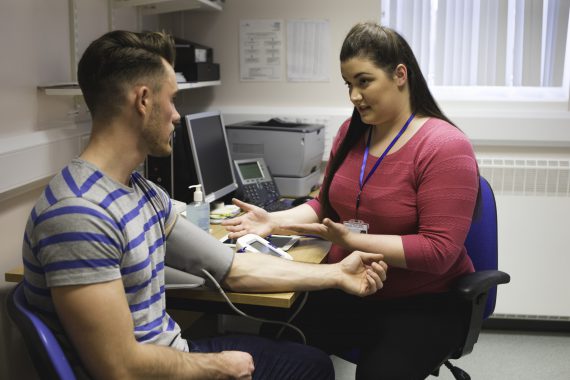The Government has launched a call for evidence to support its Men’s Health Strategy, which was announced last year and is the first of its kind.
Health professionals are among those being asked for ideas and evidence to the ‘unique challenges’ men face throughout their lives.
The strategy is being developed to tackle ‘stark inequalities’ in men’s health with those in deprived areas likely to die earlier as well as significant variation in life expectancy among men from different ethnic groups.
Men are disproportionately affected by a number of health conditions, including cancer, cardiovascular disease and type 2 diabetes, the evidence call noted.
Data shows that men in England live on average four years fewer than women at 79.1 years compared with 83 respectively.
Mental health also forms part of the call with the Government noting that around three in four people who died by suicide in 2023 were men.
The evidence call – which is open for 12 weeks – is asking questions around what topics the Men’s Health Strategy should cover, health behaviours and literacy, specific conditions impacting men.
Improving men’s access, engagement and experience of the health service is a key area of focus, it said.
But it was also about ‘understanding and identifying areas where we can improve support for healthier behaviours’, it continued.
Evidence suggests that men are also more likely to engage in unhealthy behaviours such as smoking, harmful gambling, alcohol consumption and substance misuse, some of which are risk factors for diseases such as cancer and dementia.
Members of the public as well as academics and stakeholder organisations are all being asked to feed into the process.
Health and social care secretary Wes Streeting said: ‘Every day, men across England are dying early from preventable causes. Men are hit harder by a range of conditions, while tragically suicide is the leading cause of death for men under 50.
‘Our Plan for Change means we will tackle these issues head on through a men’s health strategy, and today’s call for evidence is the crucial next step in understanding what works, what doesn’t, and how we can design services men will actually use.
‘I urge people to come forward to share their views.’
David Fothergill, chairman of the Local Government Association Community and Wellbeing Board, said: ‘We are pleased that the Government has announced plans to launch the first-ever Men’s Health Strategy with a call for evidence.
‘It’s a significant step towards improving men’s health outcomes and ensuring that men can live healthier, longer, happier lives.’
Amy O’Connor, global lead for policy and advocacy at Movember, said: ‘Too many men are dying too young, the men’s health strategy is a once in a generation opportunity to invest in positive change for men and their loved ones. Share your solutions – whether it’s more community support groups, improved education, or enhancing clinical training, to create a lasting impact on the future of men’s health.’
Julie Bentley, Samaritans CEO, said: ‘Suicide is the biggest killer of men under 50 so it’s critical that suicide prevention is front and centre of this strategy. With men making up 75 percent of all suicides, this strategy is a real opportunity to prevent thousands of deaths.
‘Recognising what works for different groups of men, focusing on key risk factors and providing evidenced based support will be crucial and we’d encourage everyone to submit evidence to this important consultation. We look forward to working with Government on meaningful ways to cut suicide rates and save lives.’
This comes amid separate work on the women’s health strategy, with the previous government having launched a ‘landmark’ women’s health survey in 2023. Meanwhile, last year, a group of MPs said GPs need more training to end ‘medical misogyny’.












Could start with sex-equality and elimination of discrimination based on sex and gender here, but I think someone might be unhappy with that. Health and medicines both seem to discriminate totally out of human control anyways.